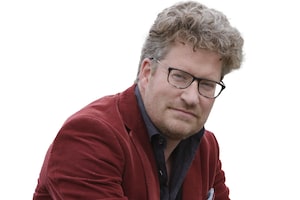A woman gasses up at a gas station in Mississauga, Ont., on Feb. 13. Politicians should stand by the historic decision to put a price on carbon and move forward with the scheduled increase on April 1. There are better ways to improve affordability.Christopher Katsarov/The Canadian Press
Whenever I hear politicians propose to cut the carbon price, I can’t help but think back to my childhood growing up with divorced parents.
On the rare occasions my dad took me for weekends, he would offer me candy and let me stay up late.
“Why can’t you be more like him?” I’d yell after returning home as my mom made me do my homework, eat vegetables and go to bed on time.
So it is with proponents of Axe the Tax. They offer us candy, when the federal government, like my mom, expects us to live responsibly.
Our kids are counting on us to be good ancestors, since their health, safety, air, water and food is put at grave risk when we pollute too much. That’s why I beg all politicians to stand by the historic decision to put a price on carbon and move forward with the scheduled increase on April 1. There are better ways to improve affordability, such as policies to reduce housing, child care and other major costs of living.
Don’t get me wrong, I know the candy is appealing. Those opposed to the federal carbon price promise to save us money.
Generally they won’t, because research conducted at the University of Calgary shows the carbon price contributes less than 1 per cent to our major costs of living, such as rent and food. The rebate we get back is more than what most of us pay for our pollution.
Even more appealing is the suggestion we don’t need to feel guilty.
When we’re dutifully driving our kids to hockey, soccer and music lessons, no one wants to feel like we’re harming our kids because we’re driving a vehicle that burns gas.
Or when we work hard to pay for home heating so our children and grandchildren stay warm amid the harsh Canadian winter, no one wants to consider that our furnaces burn fuels that put our offspring at risk.
So we respond when a national leader suggests we can set that guilt aside. And what sweet relief it is to feel let off the hook.
But a politician’s promise that pollution can be free is no more realistic than my childish fantasy that I could live on candy alone.
We are all entangled in an energy system that helps and harms our children. While it enables us to taxi our kids around, and keep them warm, it also poisons the air they breathe, evaporates the water they need to drink and burns the forests in which they play.
That is why faculties of medicine across the country, including my own at UBC, teach that climate change is the greatest risk to human health in the 21st century.
Recognizing we are entangled, the carbon rebate pays us back for our efforts to pay for pollution and pocket any savings when we reduce our emissions.
Still, some say we can’t afford to pay for the messes made by our pollution.
My response to that is we don’t solve wallet problems by neglecting climate problems. We solve wallet problems by reducing expenses such as child care, housing and postsecondary.
So we need provinces to accelerate implementation of the historic $10-a-day child care plan funded by the Trudeau government.
We need to resist NIMBYism and get more homes built, as Conservative Leader Pierre Poilievre urges – something the federal housing accelerator fund is now successfully doing.
We need home prices to stall to restore affordability for all. As we reduce major costs of living, it’s easier to accept there really is no choice to pay, or not to pay, for our pollution.
The only choice is to pay less now, and get a rebate. Or burden our kids to pay more later.
Later abuses the authority we wield over our kids. Since they can’t vote, they have to trust us to do more – not less – to fight climate change. This means urgently cutting smog and trash, and paying for our pollution – present and past.
At stake is our legacy. Nobody’s tombstone will read: “I’m proud I didn’t pay for my pollution.” But we might write: “I tried to be a good ancestor.”
To preserve summers without smoke, winters when our kids can ski, water they can drink and forests and wildlife with which they can live in awe.
That’s why we pay for our pollution.
Because nobody wants to be remembered for wrecking the planet for our kids when we had a last chance to protect it.
Dr. Paul Kershaw is a policy professor at UBC and founder of Generation Squeeze, Canada’s leading voice for generational fairness. You can follow Gen Squeeze on Twitter, Facebook and subscribe to Paul’s Hard Truths podcast.
 Paul Kershaw
Paul Kershaw